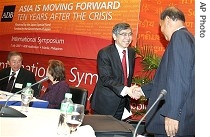-
(单词翻译:双击或拖选)
Manila
02 July 2007
Asian economic experts say regional integration1 is the best way to prevent another financial crisis like the one that began 10 years ago. The region has bounced back, but officials at the Asian Development Bank are pushing governments to develop ways to avoid future economic breakdowns2. Douglas Bakshian reports from Manila.
 |
| Asian Development Bank President Haruhiko Kuroda, second from right, shakes hands with Philippines' former Finance Secretary Roberto Ocampo, right, 02 Jul 2007 |
In his comments at an Asian Development Bank conference in Manila, he took a swipe at Western-dominated lenders such as the International Monetary5 Fund.
"We need to set up an Asian monetary organization," he said. "And that needs to be set up in Asia so that in the future instead of people talking about the Washington consensus6, they can be talking about the Manila consensus."
During the early 1990s, most Asian countries saw their economies expand rapidly. Billions of dollars in foreign investment poured into the region. But in early 1997, investors7 in Thailand became worried about the country's ability to repay foreign debt and they sold the baht. Thailand gave up trying to keep the currency from depreciating8, and floated it on July 2nd, 1997, triggering a financial panic that swept across much of Asia.
The IMF lent money to several governments to stabilize9 their finances, but imposed tough demands in return, such as cutting budgets and raising interest rates. Some critics say those measures worsened the effects of the crisis, although other experts say they forced governments to strengthen their banking10 systems.
It took nearly a decade for a full recovery across the region.
One financial safety mechanism created since the crisis is the Chiang Mai initiative, short-term currency swaps11 between central banks to replenish12 depleted13 reserves. The Association of Southeast Asian Nations, Japan, China and South Korea organized it.
South Korean Commerce Minister Chung Duck-koo calls the measure effective, and criticizes management by the IMF in Washington. He compares the Asian financial crisis of 10 years ago to a fire being battled by firefighters located an ocean away.
"Since the big city fire department was located too far away, it seems that what we needed was a voluntary community fire brigade to minimize the damages through initial response," he said.
ADB President Haruhiko Kuroda also stressed that Asia's recovery from the crisis underscores the importance of regional economic integration and cooperation.
"The evolving regional economic environment, cross-border production networks, and the advances in information technology helped leaders recognize the need to work together to build better resilience to potential shocks, both external and internal," he said.
The Asian Development Bank is helping14 develop a regional bond market as one way of strengthening financial systems. It also advocates regional programs on trade, investment, finance and cross-border infrastructure15 as other ways to integrate and grow the economy of Asia.
 收听单词发音
收听单词发音
1
integration

|
|
| n.一体化,联合,结合 | |
参考例句: |
|
|
|
2
breakdowns

|
|
| n.分解( breakdown的名词复数 );衰竭;(车辆或机器的)损坏;统计分析 | |
参考例句: |
|
|
|
3
funnel

|
|
| n.漏斗;烟囱;v.汇集 | |
参考例句: |
|
|
|
4
mechanism

|
|
| n.机械装置;机构,结构 | |
参考例句: |
|
|
|
5
monetary

|
|
| adj.货币的,钱的;通货的;金融的;财政的 | |
参考例句: |
|
|
|
6
consensus

|
|
| n.(意见等的)一致,一致同意,共识 | |
参考例句: |
|
|
|
7
investors

|
|
| n.投资者,出资者( investor的名词复数 ) | |
参考例句: |
|
|
|
8
depreciating

|
|
| v.贬值,跌价,减价( depreciate的现在分词 );贬低,蔑视,轻视 | |
参考例句: |
|
|
|
9
stabilize

|
|
| vt.(使)稳定,使稳固,使稳定平衡;vi.稳定 | |
参考例句: |
|
|
|
10
banking

|
|
| n.银行业,银行学,金融业 | |
参考例句: |
|
|
|
11
swaps

|
|
| 交换( swap的名词复数 ); 交换物,被掉换者 | |
参考例句: |
|
|
|
12
replenish

|
|
| vt.补充;(把…)装满;(再)填满 | |
参考例句: |
|
|
|
13
depleted

|
|
| adj. 枯竭的, 废弃的 动词deplete的过去式和过去分词 | |
参考例句: |
|
|
|
14
helping

|
|
| n.食物的一份&adj.帮助人的,辅助的 | |
参考例句: |
|
|
|
15
infrastructure

|
|
| n.下部构造,下部组织,基础结构,基础设施 | |
参考例句: |
|
|
|















